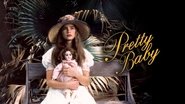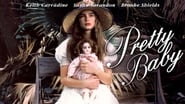punishmentpark
After seeing Eva Ionesco in Roman Polanski's 'The Tenant', and then digging a little deeper into the facts of her life, I remembered I had the DVD of 'Pretty Baby', which was partly inspired by her story, even if another story (that of photographer E.J. Bellocq and the prostitutes of Storyville, New Orleans) was obviously at least an equally big inspiration. Louis Malle begins the portrayal of this Storyville slowly and with care; we enter a whorehouse and get to know its inhabitants as human beings trying to get by in their day to day. The prostitutes, the pianist, the madam, the bouncer, the customers and... the children. It doesn't matter how careful you'll go about telling a story like this, it wíll have its impact. Then the story proceeds, and young Violet's initiation becomes a fact. Malle finds a balance between telling the facts as straight up as possible and showing a world that is filled with hopes, loves and other human follies and reveries against all odds.The nudity of Brooke Shields feels rather natural, but we all know that sort of thing doesn't fly anymore - and with good reason. The acting is pretty good, especially Keith Carradine's, but Shields' job is truly commendable. The story is just about satisfactory, but it sort of meanders without really digging deep into certain dramatic aspects - maybe that is actually the charm of it.A good 7 out of 10.
James Hitchcock
"Pretty Baby" is set in 1917 in Storyville, the red-light district of New Orleans. At one time the city was notorious for legally tolerated prostitution, although this came to an end because of pressure from the Army and Navy following America's entry into World War I, shortly after the events depicted in the film. The main characters are Hattie, a prostitute working in a high-class brothel, her 12-year-old daughter, Violet, and Ernest J. Bellocq, a photographer obsessed with taking photographs of the brothel and its inhabitants. (Bellocq was a real historical individual, Hattie and Violet are fictitious). Bellocq is not just obsessed with photography; he also becomes obsessed with young Violet whom he marries, despite her tender years, after the brothel madam has auctioned off her virginity to the highest bidder.There are some similarities between this film and another controversial seventies film about child prostitution, Martin Scorsese's "Taxi Driver". Both films introduced a young actress who would go on to become a well-known star, Brooke Shields here and Jodie Foster in Scorsese's film, and both girls give quite remarkable performances characterised by a disturbing mixture of innocence and sexual precocity. Foster has become one of the cinema's most accomplished actresses, whereas, in my view at least, Shields has never really risen to the same heights, although she has remained a well-known Hollywood name. Here, however, the young Brooke's performance is marked by a greater emotional depth and immediacy than she has achieved in many of her roles as an adult, and she is certainly the best thing about the film, together with its elegant recreation of the period.Shields apart, however, the acting does not amount to much. In 1978 Susan Sarandon was a young actress on the verge of becoming a major star, but here as Hattie she does not really show much evidence of this. As for Keith Carradine as Bellocq, his mannered and languid acting is just dull. He had been much better the previous year in "The Duellists".It is, moreover, not just Carradine's acting that is languid; Louis Malle's direction means that the film itself moves at a stately, almost funereal, pace. It is in nothing like the same class as "Taxi Driver", which had a contemporary rather than a period setting. Scorsese's film is notable for its tension, its emotional power, its fine characterisation and its social comment, all of which are lacking here."Pretty Baby" may be set in 1917, but it is very much a film of its time, one that today tells you more about the 1970s than it does about the 1910s. In 2012, given modern fears about paedophilia, a film about a twelve-year-old prostitute which included scenes of her naked would be almost as unthinkable as it would have been in the days of the Production Code. In the good old nineteen-seventies, however, there was a widely-held feeling that every film director worthy of the name- certainly every auteur director worthy of the name- was under a solemn duty to break as many taboos as he possibly could, without regard to traditional views of morality or decency, and Malle, who had previously made "Le Soufflé au Coeur" about mother-son incest, was clearly an auteur of this stamp. The film was quite controversial at the time, although not nearly as controversial as a film on this subject would be today.With many once-controversial works of art, the conventional modern reaction is to raise one eyebrow and to ask, rhetorically, "What was all the fuss about?" With "Pretty Baby" a more likely reaction would be to ask, non-rhetorically, "Why wasn't there more fuss?" Malle's artistic freedom was defended by many critics who today would be howling for his lynching from the nearest lamp-post. That said, the film is still widely available on DVD and is occasionally shown on television, having acquired something of the status of a historical artifact. Perhaps that is how it deserves to be best-remembered, as an ancient monument to a curious type of seventies permissiveness. It manages to achieve the strange feat of being simultaneously controversial and boring. 5/10






